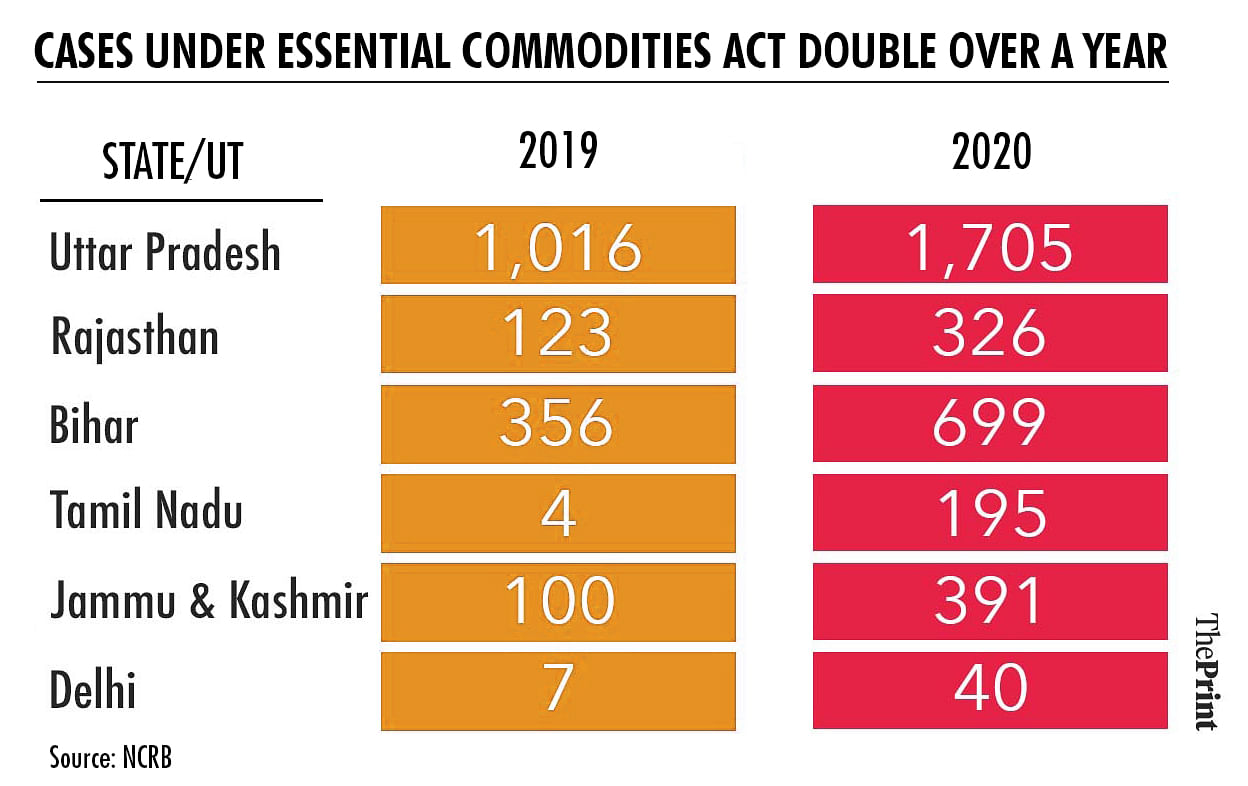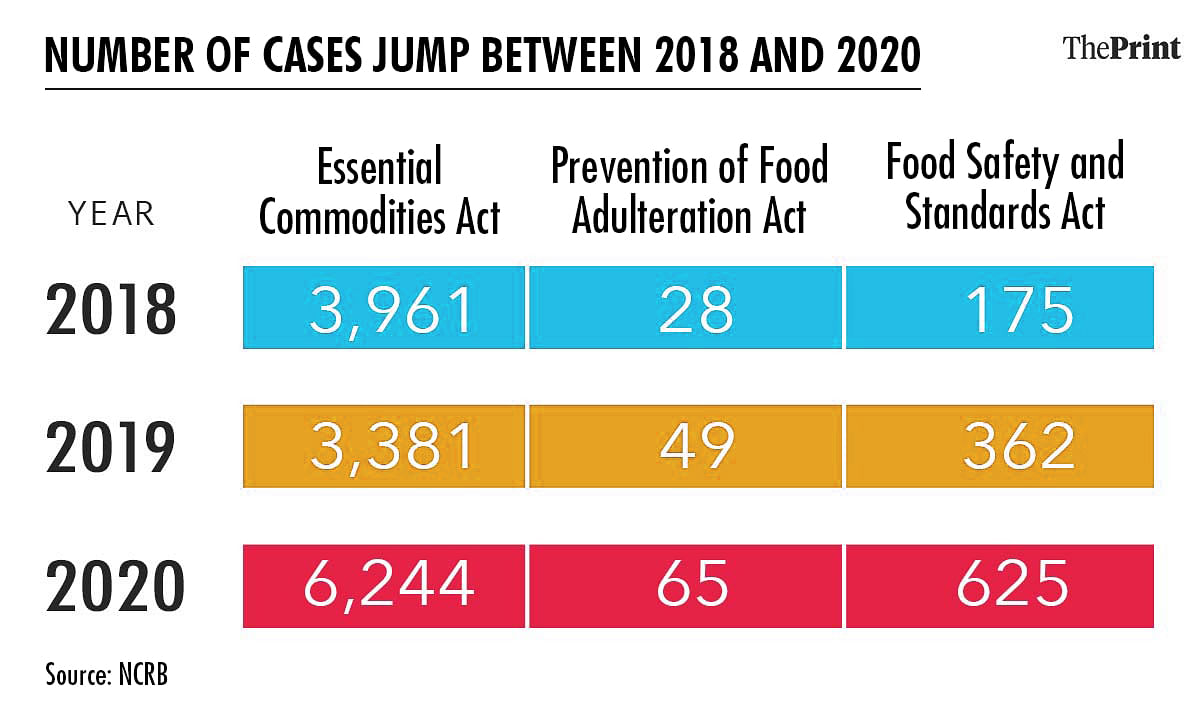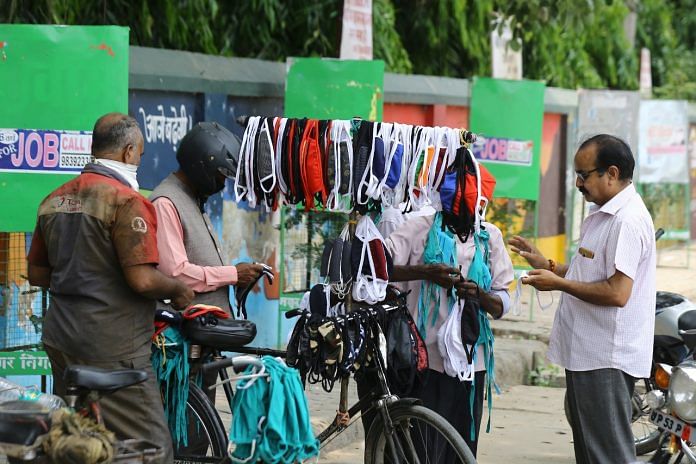New Delhi: The Essential Commodities Act, which has been a matter of contention between the protesting farmers and the central government for nearly a year now, saw cases registered under the law nearly double in 2020 on a year-on-year basis, according to the latest National Crime Records Bureau (NCRB) data.
Cases related to the Act jumped on a national level to 6,244 in 2020 from 3,381 in 2019 — an 85 per cent increase, the data showed. The crime rate (incidence per one lakh of population) related to the law also jumped from 0.3 to 0.5 in the same period.
A considerable jump was also seen in registration of cases related to the EC Act on the state level.
While Maharashtra witnessed a 56 per cent rise in the cases — to 524 in 2020 from 336 in 2019 — Rajasthan and Bihar saw cases jump from 123 to 326, and 356 to 699, respectively. Tamil Nadu, which saw barely four cases under the Act in 2019, registered 195 cases in 2020.

The NCRB report also showed a large number of pending cases under the Act. The total cases related to the Act, pending investigation at the end of 2020 was at 4,080.
There were over 48,000 cases pending trials at the beginning of 2020, but this number closed at a much-higher 52,173 at the end of the year.
Also read: Meghalaya farmer is now richer than Punjab’s
Why the increase
According to senior officials familiar with the matter, the massive jump in cases could be attributed to the fact that the central government notified certain commodities, such as masks and sanitisers, as essential last year, in view of the Covid pandemic.
These items were notified in order to check their high prices and shortages during the initial months of the pandemic and the nationwide lockdown.
“During the first wave of Covid, many vendors started hoarding essentials like sanitisers and masks… to increase price and create an artificial scarcity. Many even started producing fake sanitisers illegally and sold them at high prices. People even copied brands, which is a trademark and copyright violation. We booked several people in these cases,” said Devesh Srivastava, Special Commissioner of Police, Crime, Delhi Police.
The maximum number of cases in the year were registered in Uttar Pradesh, swinging to 1,705 in 2020 — up from 1,016 in 2019.
“There were numerous cases registered last year against people involved in hoarding and illicit trade of essential commodities, such as masks and sanitisers. These huge numbers of cases have contributed to the jump in overall cases under the EC Act,” said Prashant Kumar, Uttar Pradesh Additional Director General of Police (Law and Order).
“Apart from black marketing of essential commodities such as masks and sanitisers, many people were booked for doing malpractice in the free ration distribution scheme introduced during the lockdown and Covid outbreak. There were a large number of such cases detected in 2020 and strict action was taken against them,” added Kumar.
When the pandemic broke out last year, the Narendra Modi government notified the products necessary for disease containment, such as prices of alcohol used in manufacturing hand sanitisers, in a bid to check shortage of product availability, and subsequent price hike. This was subsequently extended to various types of masks and hand sanitisers.
Relevant still?
The massive spike in registration of cases under the Essential Commodities Act proves its relevance, amid the farmers’ protest to retain the old law.
Last year, the Modi government amended several provisions related to the Act, via the Essential Commodities (Amendment) Act 2020. It also brought in two other laws: The Farmers’ Produce Trade and Commerce (Promotion and Facilitation) Act, and The Farmers (Empowerment and Protection) Agreement on Price Assurance and Farm Services Act.
Farmers have been protesting against these laws for months now at multiple borders of the national capital.
The Supreme Court put the three new farm laws in abeyance in January this year, including the new essential commodities law. This forced the central government to use powers of the old Act despite excluding many commodities like pulses and onions from price controls and stock limits under the amended law.
Shortly after amending the Act last year, the Modi government imposed a stock limit on onions across the country. It also imposed a stock limit on pulses.

Other relevant acts such as the Prevention of Food Adulteration Act, 1954, and Food Safety and Standards Act, 2006 also witnessed a rise in cases in 2020 — from 49 in 2019 to 65 in 2020, and from 362 to 625, respectively. However, the crime rate under both these Acts remained unchanged.
(Edited by Amit Upadhyaya)
Also read: NSS survey on farmers is a mid-term report card of Modi’s promise, with ‘fail’ written over it



